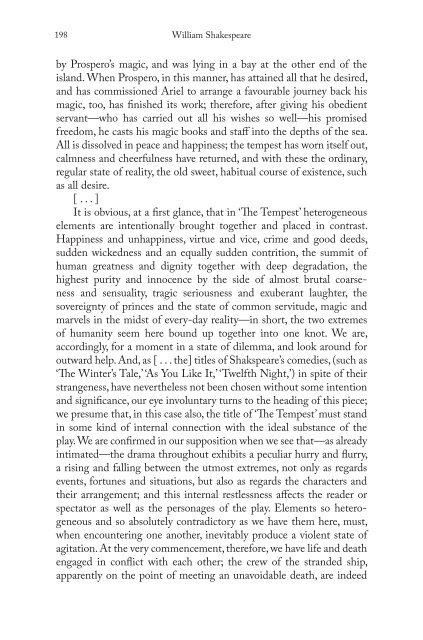Blooms Literary Themes - THE TRICKSTER.pdf - ymerleksi - home
Blooms Literary Themes - THE TRICKSTER.pdf - ymerleksi - home
Blooms Literary Themes - THE TRICKSTER.pdf - ymerleksi - home
You also want an ePaper? Increase the reach of your titles
YUMPU automatically turns print PDFs into web optimized ePapers that Google loves.
198<br />
William Shakespeare<br />
by Prospero’s magic, and was lying in a bay at the other end of the<br />
island. When Prospero, in this manner, has attained all that he desired,<br />
and has commissioned Ariel to arrange a favourable journey back his<br />
magic, too, has fi nished its work; therefore, after giving his obedient<br />
servant—who has carried out all his wishes so well—his promised<br />
freedom, he casts his magic books and staff into the depths of the sea.<br />
All is dissolved in peace and happiness; the tempest has worn itself out,<br />
calmness and cheerfulness have returned, and with these the ordinary,<br />
regular state of reality, the old sweet, habitual course of existence, such<br />
as all desire.<br />
[ . . . ]<br />
It is obvious, at a fi rst glance, that in ‘Th e Tempest’ heterogeneous<br />
elements are intentionally brought together and placed in contrast.<br />
Happiness and unhappiness, virtue and vice, crime and good deeds,<br />
sudden wickedness and an equally sudden contrition, the summit of<br />
human greatness and dignity together with deep degradation, the<br />
highest purity and innocence by the side of almost brutal coarseness<br />
and sensuality, tragic seriousness and exuberant laughter, the<br />
sovereignty of princes and the state of common servitude, magic and<br />
marvels in the midst of every-day reality—in short, the two extremes<br />
of humanity seem here bound up together into one knot. We are,<br />
accordingly, for a moment in a state of dilemma, and look around for<br />
outward help. And, as [ . . . the] titles of Shakspeare’s comedies, (such as<br />
‘Th e Winter’s Tale,’ ‘As You Like It,’ ‘Twelfth Night,’) in spite of their<br />
strangeness, have nevertheless not been chosen without some intention<br />
and signifi cance, our eye involuntary turns to the heading of this piece;<br />
we presume that, in this case also, the title of ‘Th e Tempest’ must stand<br />
in some kind of internal connection with the ideal substance of the<br />
play. We are confi rmed in our supposition when we see that—as already<br />
intimated—the drama throughout exhibits a peculiar hurry and fl urry,<br />
a rising and falling between the utmost extremes, not only as regards<br />
events, fortunes and situations, but also as regards the characters and<br />
their arrangement; and this internal restlessness aff ects the reader or<br />
spectator as well as the personages of the play. Elements so heterogeneous<br />
and so absolutely contradictory as we have them here, must,<br />
when encountering one another, inevitably produce a violent state of<br />
agitation. At the very commencement, therefore, we have life and death<br />
engaged in confl ict with each other; the crew of the stranded ship,<br />
apparently on the point of meeting an unavoidable death, are indeed

















